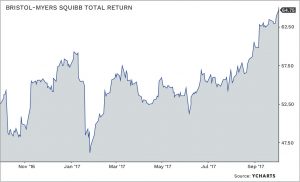Nelson Capital Management



Bristol-Myers Squibb (tkr: BMY) is a pharmaceutical company focused on specialty medicines (those with higher margins and still under patent protection) with a further emphasis on immuno-oncology. The company’s drugs fall into six divisions: oncology, cardiovascular, immunology, neurology, virology/infectious disease and mature drugs in a variety of areas. BMY has made a big commitment to immuno-oncology and has two drugs approved for treatment of several different types of late stage cancer, Yervoy and Opdivo. Because immuno-oncology is such a new field, the results of drug clinical trials are closely scrutinized. When Opdivo failed to create better patient outcomes in first-line treatment of non-small cell lung cancer in a trial reported last fall, BMY’s stock fell over 15%. A careful review of the company led us to conclude that immuno-oncology treatments will have an important and growing role in cancer treatment and that this was a buying opportunity.

BMY’s strategy is to combine the resources, scale and capability of a large pharmaceutical company with the speed and focus on innovation more characteristic of the biotech industry. Analysts believe that the market for immuno-oncology drugs will be about $14 billion by 2019 and will grow to $34 billion by 2024. BMY’s two drugs had sales of $6.7 billion last year, with Opdivo accounting for $3.77 billion in 2016. These treatments are very expensive: $140,000 for the initial round of administration and maintenance of $14,000 per month. Therefore, it is critical to sort out which patients will benefit. Opdivo and Yervoy have one main competitor at present, Merck’s Keytruda.
With Pfizer, BMY also co-owns and markets one of the new novel oral anticoagulants (NOACs). Eliquis generated sales of $3.34 billion in 2016. Sales in this market are expected to be over $30 billion by 2024. Eliquis has three competitors, but is doing well and holds over 40% of the market. The NOACs all have a better safety profile than Coumadin, the longstanding standard anticoagulant, with fewer bleeding complications and equal efficacy. The main limitation in their use has been the lack of a reversal agent, but that is under active development. BMY is also an attractive acquisition target, with cash on the books of $4 billion. The stock pays a solid dividend of 2.5%. BMY appointed a new chief science officer this year, Thomas Lynch, MD, who was an oncologist specializing in lung cancer treatment at Massachusetts General. His expertise in this field should tremendously benefit BMY.
Individual investment positions detailed in this post should not be construed as a recommendation to purchase or sell the security. Past performance is not necessarily a guide to future performance. There are risks involved in investing, including possible loss of principal. This information is provided for informational purposes only and does not constitute a recommendation for any investment strategy, security or product described herein. Employees and/or owners of Nelson Roberts Investment Advisors, LLC may have a position securities mentioned in this post. Please contact us for a complete list of portfolio holdings. For additional information please contact us at 650-322-4000.
Receive our next post in your inbox.